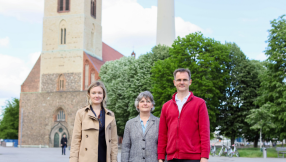
Can a female soul be trapped inside a male body? This is what the advocates of transgender ideology seem to want us to believe. But what does it even mean to be trapped in the 'wrong body'?
After all, a person's sex is an intrinsic part of their DNA. Aside from a tiny proportion of people with intersex conditions (which is different to transgender), all of us are genetically male or female, with either XX or XY chromosomes permeating almost every cell of our body. Being male or female is a biological reality, and it affects every part of our physiology, including our brains. We are male or female all the way down and no surgery or hormone treatment can ever change that, it can only change outward appearance.
Of course, that doesn't mean men and women are different in every way. But it means that being male and female is an intrinsic part of who we are as a biological creature and that cannot be changed by any medical intervention, however drastic.
That is the biological reality. But it hasn't stopped transgenderism becoming a formidable social force in recent years. The number of cases of transgenderism especially among the young has shot up over the last decade. In 2009-10, for example, there were just 96 referrals of children to the Tavistock clinic's Gender Identity Development Service. By 2018-19 that number was 2,590 – almost 27 times bigger. Around three quarters of them are girls who believe they are boys.
This explosion in gender confusion has many causes, including the challenges of growing up as a girl in a sex- and pornography-saturated culture, the role of the internet and social media in spreading the idea of gender transition as a solution to young people's problems, and the promotion of transgenderism and gender fluidity in media, entertainment and education.
Warwickshire County Council, for example, has produced a Relationships and Sex Education programme in which 9 year-olds are told a story about 'King Binary':
'The trouble is, not everyone felt that they fitted neatly in either Sheland or Heland, especially as the small children grew up and began to explore who they were and where they belonged. Some of the girls and boys felt they had been sent through the wrong door and would actually be much happier on the other side of the river, they really didn't feel like they were meant to be girls or boys. When King Binary heard how confused and upset some of his people were he really didn't know what to do, things had always been this way so what on earth could he do? He decided to call a meeting.'
Teachers are told to 'ask the children to come up with ideas to solve the problem that King Binary and his people have.'
Material like this, which is likely to become more common when Relationships Education becomes compulsory in all schools in England in September 2020, is only going to increase gender confusion among the young.
Tragically, more and more people who undergo gender transition are coming to regret it and want to go back. Yet many of the interventions being administered to young people have irreversible effects. These include the impact of radical surgery such as breast removal and the long-term effects of hormone treatment, such as tenacious facial and body hair, deeper voice, and permanently altered genitals, and of breast-binding, such as serious back issues and reduced lung capacity.
What if we didn't reinforce gender confusion in the young? Studies show that up to 90 per cent of young people who experience gender confusion but receive no affirming intervention desist in their confusion by the end of puberty, whereas when we intervene, more than 90 per cent of children go on to continue to more radical and permanent forms of transition.
Not that this necessarily makes them happier: the suicide rate among those who have transitioned remains 19 times higher than the general population. Transgenderism also creates wider social problems for girls and women in that it allows biological males to enter private female spaces, where they may be a threat, and sporting competitions, where they often have an unfair advantage.
These are problems largely of our own making, driven by faulty ideology and untested experimental treatment.
Yet at the present moment we seem intent on making things worse. At the coming election Labour and the Liberal Democrats have pledged to introduce self-declaration of gender change without medical input, while the Green Party goes one step further and promises to allow children to self-declare their gender regardless of what their parents think.
This push for more extreme policies of gender fluidity sounds bizarre and dystopian, but a recently unearthed document from a major international law firm shows how international progressive elites are deliberately facilitating the bewildering rise of transgender politics.
What should Christians think about all this and what can we do about it? Sharon James has written an excellent and highly accessible short primer on gender ideology for Christians. With chapters on 'What is "Gender Theory"?', 'The "Transgendering" of Children' and 'How Should we Respond?', Gender Ideology: What Do Christians Need to Know? is essential reading for any Christian wanting to get a better understanding of what on earth is going on and what we can do in response. It is thoroughly referenced so you always know you're getting sound information, and also includes personal stories to keep it grounded in human experience.
The Bible says that in the beginning God created humankind male and female in his own image. Our culture seems to think it knows better. But as always, such hubris only leads to trouble. As Christians we need to keep our heads clear on these important matters, responding with both compassion and truth, and weathering the storms of hostility that rage around us.
Dr Will Jones is a Leamington-based writer, a mathematics graduate with a PhD in political philosophy and a diploma in biblical and theological studies. He blogs at www.faith-and-politics.com and is author of Evangelical Social Theology: Past and Present (Grove, 2017). He can be found on Twitter @faithnpolitic













